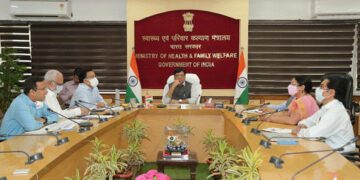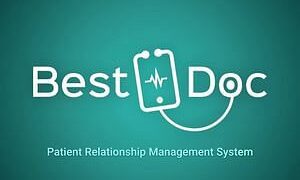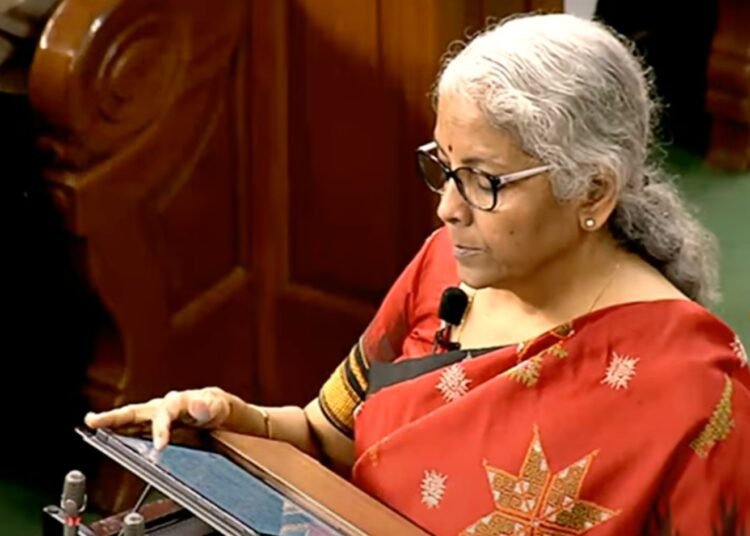By Health In Five Writer
Finance Minister Nirmala Sitharaman presented the Union Budget 2023-24 and the health sector had several announcements:
- Facilities in select ICMR labs will be made available for research by public and private medical faculties
- A mission to eliminate sickle cell Anemia by 2047 will be launched to create awareness creation & universal screening of 7 crore people under the age of 0-40
- The implementation of dedicated multidisciplinary courses for medical devices to be supported by the government in institutions to ensure skilled manpower for futuristic medical tech and high end manufacturing and research.
- The establishment of three centres of excellence for artificial intelligence to enable ‘Make AI for India’ and ‘Make AI work for India’ to enhance India’s digital prowess.
- National Data Governance policy will be introduced which will enable access to anonymised data
- 157 new nursing colleges will be established in core locations
#IndustryReactions
“It is encouraging to see the importance that the healthcare sector has got in this year’s budget. Skilling of healthcare nurses and allied workers has been a long-standing gap, hindering healthcare delivery expansion, and the Union Govt. has taken a step in the right direction to address this. A significant increase in nursing and medical colleges, strong emphasis to promote innovation and R&D, PPP in healthcare and medtech specialised workforce will lay a stronger roadmap for the future.
The initiatives announced to strengthen the digital healthcare infrastructure will prove to be beneficial for the healthcare sector in the years to come. The mission to eliminate sickle cell anemia by 2047, income tax rebates and disposable income to be channeled to essential items – healthcare being one, are laudable efforts undertaken by the government. However, the long-standing requirements of the sector to increase healthcare spending as GDP per cent to 2.5 per cent, custom duty reduction to balance demand with supply and the nascent healthcare manufacturing base in equipment scheme, streamlining embedded indirect taxes like GST in healthcare making a smooth flow of credit difficult across value chain and low-cost financing schemes to strengthen healthcare infrastructure, primary care and improved working capital has not been addressed. In the last couple of years, a big positive is the partnership spirit with the private sector in healthcare and coherent initiatives undertaken to take these goals towards reality for a healthier prosperous India.” — Dr Shravan Subramanyam, President, NATHEALTH
“The budget announcements for healthcare sector have considered the areas of research & development, skill development, awareness, infrastructure and preventive healthcare, which are very welcome. Focus on R&D via public private partnerships and benefits to industry are in line with the industry expectations and will help the country in its positioning as innovation hub. Specific recognition to research and manufacturing of medical devices will fulfill in meeting sector’s growth targets, increase manufacturing activity and meet the demand of medical devices at affordable prices in the long run. Overall, the announcements are inclusive and far-sighted, giving due importance to the sector.” — Shuchi Ray, Partner, Deloitte India
“In this Union Budget, the government has focused on some of the core needs of the health and wellness sector. The plan to establish 157 nursing colleges as collocated facilities alongside medical colleges will help cover the shortage of trained healthcare workforce and lead to greater healthcare coverage of the out-of-hospital medical services. The plans to provide access to ICMR labs and other R&D facilities as well as a collaborative approach to pharmaceuticals research and encouragement of private sector investments, multi-disciplinary training for R&D and manufacturing of high-quality medical devices, and various other such measures are going to augur well for the overall universal healthcare access and quality in India.” — Meena Ganesh, Co-Founder & Chairperson, Portea Medical
“Setting up various nursing colleges across the country is a much-needed move. This will help prepare the nation against an outbreak like COVID-19 so that we have adequately trained medical professionals. Sickle cell anemia is one of the genetic diseases that has been posing a major setback to the country’s health status, especially our tribal population. We appreciate the announcement of the mission to eliminate this disease by 2047. In addition, extending ICMR labs facilities for public and private medical colleges and private sector R&D teams for research purposes will lead to better research outcomes and give rise to innovative solutions. This will address the research gaps in noncommunicable diseases such as diabetes and cardiovascular disease.” — Dr B.M Makkar President, RSSDI
“Budget 2023-24 focused on enhancing India’s capabilities and resources through increased manpower, R&D, and PPP in healthcare sector. Setting up of 157 new Nursing colleges is welcome, in view of the severe shortage of nurses in the country. However the current state of existing Nursing colleges must .be evaluated for upgradation & better job opportunity for nurses to be identified to curb international migration. The idea of setting up a Center of Excellence in AI for health along with the strengthened impetus towards medical education will accelerate the development of new-age, technology-driven medical solutions for better disease management and encourage start-ups to come up with Innovative solutions in the Healthcare Delivery space. Creating awareness of prevention and early screening is not only essential in eliminating sickle cell anemia but would also be a great stepping stone for similar diseases , however its success will depend on effective implementation. The increased focus on encouraging medical education and PPP will aid the industry’s growth. The budgeted increase in healthcare expenditure of 15% does not seem to enough to tide over the current challenges of upgradation of infrastructure and providing accessibility and affordability for quality healthcare in the country. We are looking forward to clear indications of the steps to be implemented for healthcare infrastructure development and move closer towards universal health coverage with increased expenditure as a % to GDP. It would have been better if there were tax exemptions for healthcare, which is vital to reduce healthcare expenses & out of the pocket spending.” — Gautam Khanna, CEO, P.D. Hinduja Hospital & Chairman FICCI Health Services
“Many necessary changes have been put in motion in the union budget 2023. Opening 157 new nursing colleges in co-locations with the existing 157 medical colleges, and introducing multidisciplinary courses for medical devices and skilled manpower for futuristic medical technologies is a welcome step for next-generation-lent development. Initiatives like initiatives for Make AI in India and Make AI Work for India is a great step toward advanced technology development. Governance policy to enable access to anonymised data will play a crucial role in strengthening the research and development. Select ICMR labs will also be made available for research by public & pvt medical facilities, which is a great move. However, there could have been more allocation in terms of investments in theital health and therapeutics.” — Srinivasa Vivek, Co-Founder, Resolute Active Care
“We welcome the announcements made by the government in Budget 2023 particularly for the health sector. The government has taken several initiatives to strengthen the health sector in this year’s budget compared to last year. From planning a mission to eliminate Sickle-Cell Anaemia by 2047 to creating a new program for pharmaceutical research as well as providing facilities in select ICMR labs, all will be made available for research by public and private medical facilities, but some announcements to boost the area of mental health are still missing.” — Dr Jyoti Kapoor, Founder & Director, Manasthali Wellness
“The decision to provide multi-disciplinary training for the development of medical devices and support for the manufacturing of high-quality devices is going to be a key enabler for the domestic medical devices industry. These courses will not only ensure the availability of skilled manpower for future medical technology but also offer opportunities for high-end manufacturing research. The decision of opening up facilities in select ICMR labs for research by private and medical colleges will enable better infrastructure access for both individuals and organisations who are looking at undertaking research and innovation in this area.” — Runam Mehta, CEO, HealthCube
“As a digital therapeutics platform, it is encouraging to see the government focus on AI and IoT integration in health management. This will help in increasing the adoption of smart wearables such as Continuous Glucose Monitors and other devices that record vitals. Empowering medical devices and technology developers would lead to greater access, affordability and effectiveness of health management services. A number of skill development initiatives including the setting up of 157 nursing colleges across India will also help in creating a much larger pool of trained healthcare workers who will subsequently play a key role in disease management and monitoring. We hope that these decisions are implemented through effective and easier collaborations between the private and public sectors.” — Dr Arbinder Singal, Co-founder & CEO, Fitterfly
“The Finance Minister’s proposal regarding establishing 157 new nursing colleges is a welcome move. As we know, several new hospitals are opening every year, but there is a dearth of skilled healthcare workers. So, this move will help to fill this gap, especially in tier 2 and tier 3 cities. The government has also proposed a multidisciplinary course for medical devices for skilled manpower. Also, we should take pride in the fact that 220 crore COVID vaccines were given to 102 crore people. It highlights our strong healthcare strategy to tackle a health crisis of such magnitude in such an overpopulated country. We should invest in research at a grand level now and support from the Government in this direction is a welcome move. It is also great to know that leading industry players will partner in conducting interdisciplinary research, and develop cutting-edge applications and scalable problem solutions in the areas of agriculture, health, and sustainable cities. However, a few other areas like GST rationalisation in healthcare, gap funding on infrastructure in building hospitals in Tier 2 cities, and rural India in terms of capital contribution and subsidy, should have been addressed as well in the budget.” — Probal Ghosal, Executive Chairman, Ujala Cygnus Group of Hospitals
“The emphasis of the budget on digitization, with increased focus towards modern tech would ensure speedier adoption of digital tools and enhanced research in AI. Investment towards nursing colleges is a progressive move as that is the need of the hour. Infact PPP would be encouraged to ensure the government can get adequate support from private players and we as a sector are able to come up with setting these nursing colleges sooner. With digital transformation play and focus on R&D in the budget, it will be encouraged if every tertiary and quaternary healthcare facility can have a R and D division focused on advancement in pharmaceuticals , biomedical equipments as well as medical consumable to further enhance healthcare output for patients in terms of quality , safety and cost. Private labs can work in partnership with ICMR to work towards this objective and work in unison for better healthcare productivity and efficiency. Mission to eliminate Sickle Cell Anaemia is a great initiative to have a healthier population is yet another step focusing on well-being” — Dr. Tarang Gianchandani, CEO of Sir HN Reliance Foundation Hospital
“The newly announced focus on special programme to eradicate sickle cell anaemia in the country is a right step. This initiative will not only help tackle anaemic disorders but also ensure rural population leads a healthy life. The focus on Digitization with result in adaption of tools using tech with will enhance healthcare outcomes specially in Tier 2 and Tier 3 cities. The budget has greatly favoured healthcare R&D this year by announcing facilities by medical colleges and private sectors which will result in better care giving, which means focussed attention to patients as well as faster recovery. With a vision of India progressing in medical science and adopting advance technology, we will be able to upskill manpower. While the government has focused well on R&D and building the infrastructure which will encourage private sector to champion healthcare delivery, but what will further help is, how to create a robust & highly incentivized policy for domestic manufacturing of medical technology. The medical fraternity and the people of India would have benefited if there was allocation on manufacturing high-end medical devices or exemption of customs duty on import of high-end equipment.” — Behram Khodaiji, CEO, Ruby Hall Clinic
Subscribe on WhatsApp & Telegram to receive real time updates
Follow Health In Five on LinkedIn, Facebook, Twitter & Instagram









































